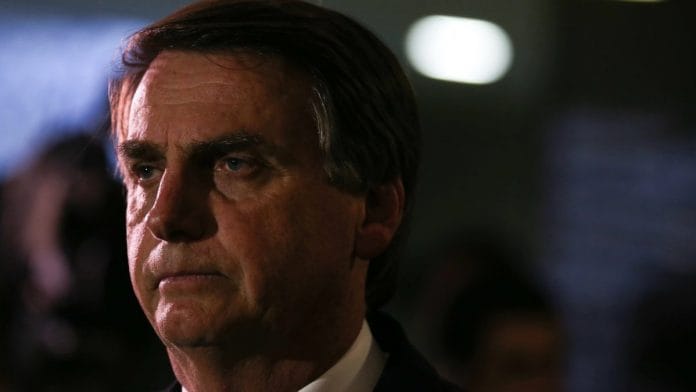A few years ago, Brazil’s political system was shaken by the $5 billion ‘Petrobras‘ scandal, with investigations pointing to the alleged involvement, directly or indirectly, of four former Brazilian presidents, including Lula da Silva and Dilma Rousseff.
The succeeding president, Michel Temer, turned out to be deeply unpopular and was met by protests just days after he assumed office.
It was in this unstable political climate that Jair Bolsonaro, a staunch Right-winger, launched his presidential campaign.
Bolsonaro, a former military man, was widely reported to have passed derogatory remarks against women, homosexuals, fellow political leaders, and won over millions when he promised to overhaul the country’s “decaying” political affairs and boost the economy.
ThePrint looks at the rise of Jair Bolsonaro and what he tells us about Brazil’s shift to the Right.
Also read: Brazil’s Jair Bolsonaro confirms Latin and South America’s Right-ward tilt
Petrobras, economic recession, and the rise of Bolsonaro
The Petrobras scandal left the Brazilian electorate deeply resentful of political corruption. Furthermore, as a consequence of the scandal centred on the oil major, the Brazilian economy entered a catastrophic recession. Brazil also continues to deal with massive levels of crime, witnessing 60,000 homicides every year.
Bolsonaro used these state of affairs as an opportunity to launch an anti-establishment presidential campaign. He promised to put Brazil’s house in order and, more importantly, solve its chronic economic problems.
A socially-regressive President
Bolsonaro was a somewhat quiet — backbencher — legislator for decades. He served in Brazil’s Chamber of Deputies, the lower house of parliament, from 1991 to 2018, but has mainly been known for his controversial remarks.
He has praised the ruthless Chilean dictator Pinochet and expressed support for Brazil’s 1964-85 military dictatorships. Other controversial remarks include saying in 2011 that he wouldn’t be able to love his son if the latter were a homosexual, and, in 2014, that a fellow member of parliament didn’t “deserve” to be raped by him.
He is an unapologetic Right-wing politician, who, during his campaign, earned the title “Trump of the Tropics”. Through his presidential campaign, Bolsonaro advocated a mix of regressive social policies and free-market economy.
Unapologetic free marketeer
For a very long time, the Brazilian political economy has been marked by populist policies. Bolsonaro and his economically-liberal Economy Minister Paulo Guedes mark a massive economic shift towards the Right.
Bolsonaro recently brought in a New Pension System bill in the Brazilian parliament.
Currently, the Brazilian government spends more than a third of its federal tax revenue on pensions, amounting to about seven per cent of the GDP. Bolsonaro’s draft plan seeks to save more than a trillion real (close to $300 billion) in the next 10 years and push up the age criterion for beneficiaries.
In January, Bolsonaro announced his plans to conduct mass privatisation, a proposal likely to be unpopular with the electorate as an Ipsos survey found in 2018 that only 17 per cent of Brazilians were in favour of privatisation.
Reforms are likely to cause a backlash
While Bolsonaro has an ambitious reform agenda, turning it into policy is likely to be an uphill task. It is anticipated that even if the federal government clears the pension reform proposals, they will be met by street protests across the country.
And here lies Bolsonaro’s greatest challenge.
It is intrinsically hard to push market reforms in a country that has been reliant on welfare for this long. Therefore, it is quite likely that Bolsonaro will eventually start looking like Argentina’s Mauricio Marci.
Marci started with a radical market reform agenda, but soon developed cold feet. Since then, Argentina has struggled to make significant progress in terms of pushing reforms.
Only time will tell whether Bolsonaro’s future will be much different.
Also read: Brazil, Ethiopia & Kenya: A new wave of unlikely economic reformers






